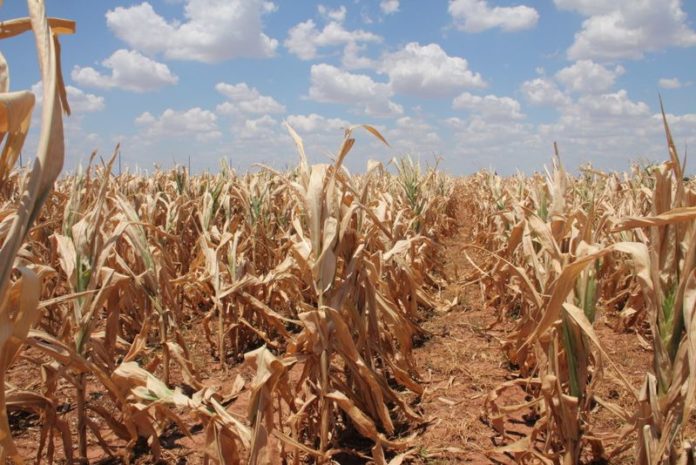The United Nations Framework Convention on Climate Change (UNFCCC) defines climate change as a change of climate which is attributed directly or indirectly to human activity that alters the composition of the global atmosphere and which is in addition to natural climate variability observed over comparable time periods.
As a country whose source of food is mainly from subsistence farming, the food situation for many rural households in Zambia has moved from bad to worse overnight. The situation is even more dire since the agricultural sector is dominated with maize production, a crop that requires heavy to normal rainfall in order to mature.
Mr Wilton Hachoona, a farmer based in Chongwe district, with a bias towards maize farming, is amongst the many farmers affected by this year’s dry spells. He spoke with emotion and regretted mono-cropping. Moreover, Mr Hachoona’s problem is a carryover from the previous farming season.
He was unable to produce extra maize to sell or enough to feed his family from the previous harvest as yields were equally low, a situation that has resulted in lack of money to sustain his family’s needs.
“This year’s drought has completely thrown my family in a world of uncertainty,” Mr Hachoona laments.
And his wife Mary bemoans what has become of her family.
“The saddest thing is seeing my children complain about food, not eating three meals a day. I am having headaches because of thinking. As at now, we will surely have difficulties in paying our children’s school fees. This is too much for me to handle,” Mary states.
As for her husband, it is now time to quit, vowing to no longer engage in the maize business but instead try out other options such as growing sweet potatoes and other crops that do not need a lot of water to mature.
Another farmer, Mr Noel Nkoma, who is based in Ngwerere, Lusaka also had his small business affected by the dry spells.
He says lack of rainfall meant high production costs to sustain growth of his crops as they require established irrigation to be grown.
Mr Nkoma singles out fuel as an added cost to maize production due to the increase in pumping water into the fields.
“Water Consumption at the farm has increased and so we need to provide an alternative to rain water for our crops. As a result, profits are never the same and as a family we have adjusted our living standards,” he says.
Mr Nkhoma adds that the ripple effect of the dry spells was also being seen in high prices of products such as stock feed in that the stock producers had to “transfer” the high cost of production to the buyers.
The accounts of Nkoma and Hachoona may not comprehensively explain the impact of climate change and struggles of many subsitance farmers; but it is clear that time to re-strategise the farming sector has dawned.
The dry spells are even more worrying as the food security situation in the country is already unstable. For example, the Global Hunger Index as of 2017 shows that 37 percent of the Zambian population had been experiencing hunger.
It is therefore certain there got to be serious intervention from Government and other cooperating partners to stave off the food crisis.
In fact, Dr. Davies Lungu, an agriculture expert at the University of Zambia, has acknowledged the catastrophic change in weather but notes that researchers are doing something about it.
“We are trying to solve the immediate problem from farmers who delay planting to still get a good yield by venturing into research that will develop a variety of early maturing seeds,” he says.
The researcher states that timing when planting crops is a key tactic to survive the status quo. To illustrate, Dr Lungu cites wheat, a temperate crop being grown locally but largely under irrigation in the cold season as it produces greater yields during this season.
Adding his voice to the discourse, Minister of Agriculture Micheal Katombo points out that such regions as Eastern, Western and Southern provinces are severely being affected by poor rainfall.
The Minister states that the current situation needs everyone to be on board since Government is already doing its part.
‘’We are working with seed generating companies to increase the seed that are drought resistant. The Ministry has also partnered with the World Bank to put across measures to sensitise farmers,’’ he said.
And Mr Katambo notes that in order to move fast in sensitising farmers, more human resource is needed, which entails that the number of agriculture extension officers is to be increased.
The Minister further encouraged farmers to desist from the practice of growing singular crops such as maize and instead diversify into crops such as soya beans, cassava and sorghum.
He also urges farmers to take the lead role in the fight against indiscriminate harvest of trees as it is one of the major contributors to climate change.

